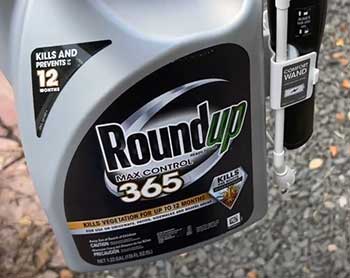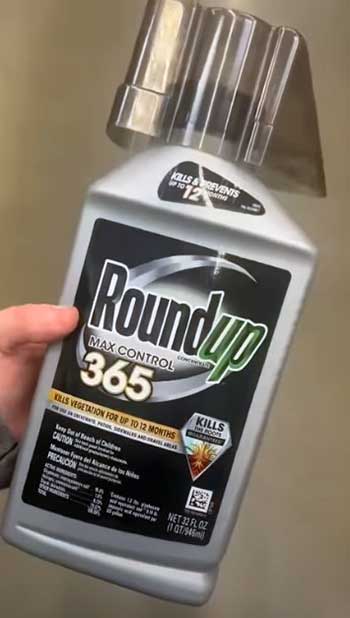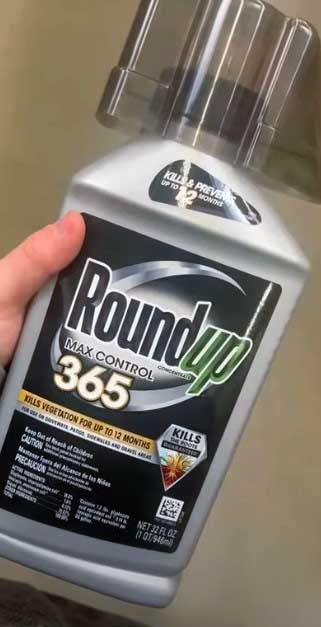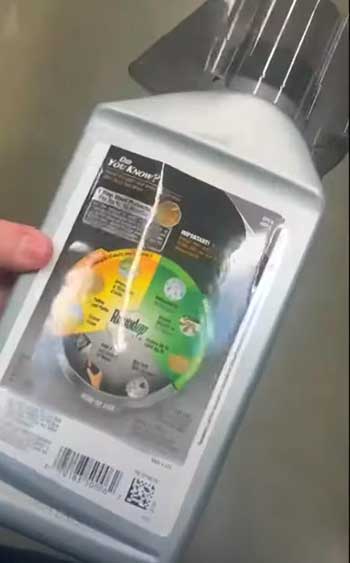
I’m thrilled to share my experience with Roundup Max Control 365, a weed killer that’s transformed how I manage my yard.
If you’re tired of battling stubborn weeds on your driveway, patio, or gravel paths, this product is a game-changer you need to consider.
Its promise of up to 12 months of weed control with visible results in just 12 hours makes it a standout choice for anyone seeking a low-maintenance, effective solution.
Trust me, this herbicide delivers, and I’m excited to walk you through why it’s worth adding to your gardening arsenal.
My Experience With Roundup Max Control 365
Last spring, I decided it was time to tackle the relentless weeds sprouting through the cracks of my driveway and along my gravel pathway. Every year, I’d spend hours pulling dandelions and crabgrass, only for them to return with a vengeance.
Frustrated, I picked up Roundup Max Control 365 after hearing it could keep weeds at bay for up to a year. I opted for the 32-ounce concentrate, which you mix with water in a tank sprayer, figuring it’d cover my 1,500-square-foot problem areas.
Mixing the solution was straightforward—6 fluid ounces per gallon of water, as the label instructed. I used a plastic tank sprayer, which felt sturdy and easy to handle. The first thing I noticed was how precise I could be with the application. I targeted the weeds directly, avoiding my nearby flower beds. The weather was sunny, around 70°F, perfect for spraying, and I made sure to apply it on a calm day to prevent drift.
Within 12 hours, I could already see the weeds wilting, their leaves turning a sickly yellow. By the next day, the transformation was dramatic—those stubborn dandelions were shriveling up, and the crabgrass looked defeated.
Over the next two weeks, the weeds continued to die off, roots and all. What impressed me most was the invisible barrier Roundup Max Control 365 created in the soil. Months later, my driveway and gravel path remained virtually weed-free, even after heavy summer rains. I did notice a few new sprouts after about six months, but they were sparse and easily managed with a quick spot treatment.
The ease of use and long-lasting results made me feel like I’d finally won the war against weeds. Compared to my previous manual efforts, this was a massive time-saver, and I felt confident knowing I wouldn’t need to reapply for nearly a year.
Pros Of Roundup Max Control 365

- Fast-Acting Formula: You’ll see weeds wilting within 12 hours of application, with full root death in 1-2 weeks, making it one of the quickest herbicides I’ve used.
- Long-Lasting Weed Prevention: The invisible soil barrier keeps weeds at bay for up to 12 months, saving you from constant reapplication.
- Rainproof in 30 Minutes: No need to worry about sudden showers washing away your efforts; it sets quickly, even in unpredictable weather.
- Versatile Application Areas: Perfect for driveways, patios, sidewalks, and gravel paths, it targets weeds without affecting nearby soil if applied carefully.
- Cost-Effective Concentrate: The 32-ounce concentrate makes up to 5.3 gallons of solution, covering large areas affordably compared to ready-to-use options.
- Effective on Tough Weeds: It tackles over 250 weed types, including stubborn ones like crabgrass, clover, and dandelions, which I struggled with for years.
- User-Friendly Mixing Instructions: The clear dilution instructions make it easy for anyone to mix and apply, even if you’re new to herbicides.
The speed of Roundup Max Control 365 is hard to beat. I was skeptical at first, but seeing those weeds droop within hours was incredibly satisfying. The long-lasting prevention is a huge plus—my driveway still looks pristine months later, and I’ve barely had to lift a finger. The rainproof feature gave me peace of mind, especially living in an area with frequent showers.
I also appreciated how economical the concentrate is; a single bottle went a long way, covering my entire problem area with solution to spare. Knowing it could handle a wide range of weeds, from pesky dandelions to tough crabgrass, made me trust it even more. If you’re looking for a reliable, efficient weed killer, these benefits make Roundup Max Control 365 a solid choice.
Also read: My Thoughts on Quick-Step Laminate Flooring
Cons Of Roundup Max Control 365

- Not Safe for Lawns: It’s a non-selective herbicide, so it’ll kill your grass if you’re not precise, which can be a hassle for mixed landscapes.
- Toxic to Pets and Humans: You’ll need protective gear during application, and pets and kids must stay off treated areas until dry.
- Limited Use Near Plants: You can’t use it near flower beds or vegetable gardens, as it may harm desirable plants if misapplied.
- Multiple Applications in Wet Climates: In rainy areas, you might need to reapply every 6-8 months, which can feel like a letdown for a “365” product.
- Not Effective on Hard Soils: It struggles on compacted soils, where penetration is limited, reducing its long-term effectiveness.
- Sprayer Compatibility Issues: You need a specific sprayer (plastic or stainless steel), as unlined steel ones can corrode, adding an extra step.
- Manual Weed Removal Still Needed: Dead weeds don’t vanish; you’ll have to pull them out, which adds a bit of labor post-application.
The biggest drawback for me was the pet safety concern. I had to keep my dog indoors for a day to ensure the treated areas were dry, which was inconvenient. The restriction on using it near my flower beds also meant I had to be extra cautious during application, which took some focus.
In my rainy region, I noticed the weed barrier wasn’t quite as effective after heavy downpours, requiring a touch-up sooner than expected. While it’s marketed as a year-long solution, don’t expect miracles in wet climates or on super hard soils. Still, these issues didn’t outweigh the benefits, but they’re worth considering before you buy.
Maintenance Tips For Roundup Max Control 365

- Apply on Calm, Warm Days: Spray when it’s above 60°F and wind-free to maximize effectiveness and prevent drift onto plants you want to keep.
- Use the Right Sprayer: Stick to plastic, fiberglass, or stainless steel tank sprayers to avoid corrosion and ensure even application.
- Test Your Sprayer First: Try it on a concrete surface before hitting the garden to confirm the nozzle is adjusted and won’t overspray.
- Keep Pets and Kids Away: Let treated areas dry completely—usually a few hours—before allowing anyone back to avoid exposure.
- Clean Equipment Thoroughly: Rinse your sprayer after use to prevent residue buildup, which can clog or damage it over time.
- Monitor and Spot-Treat: Check treated areas every few months; a quick spot treatment can extend the weed-free period.
- Store Properly: Keep the concentrate in a cool, dry place, away from kids and pets, to maintain its potency for up to four years.
Proper application is key to getting the most out of Roundup Max Control 365. I found that spraying on a sunny, calm morning worked best—my weeds soaked it up, and there was no drift to worry about. Using a plastic sprayer made the process smooth, but I learned the hard way to test it on my driveway first; my first attempt oversprayed slightly, and I had to adjust the nozzle.
Cleaning the sprayer afterward was a must to keep it in good shape for next time. I also made it a habit to check my driveway every couple of months, zapping any new sprouts with a quick spray. Storing the bottle in my garage kept it safe and effective for future use. These steps ensured my yard stayed weed-free with minimal effort.
Comparison With Other Brands
Roundup Max Control 365 Vs. Spectracide Weed And Grass Killer
Spectracide Weed and Grass Killer is another popular choice, but it’s more of a short-term fix compared to Roundup Max Control 365. While Spectracide kills weeds quickly, often within hours, it doesn’t offer the same long-term prevention. I found Roundup’s soil barrier gave me months of weed-free surfaces, whereas Spectracide required reapplication every few weeks in my gravel areas. Spectracide is also cheaper, which is great if you’re on a budget, but it lacks the staying power of Roundup’s year-long claim. If you need immediate results without long-term control, Spectracide might work, but Roundup’s durability won me over.
Roundup Max Control 365 Vs. Ortho Groundclear Year Long Vegetation Killer
Ortho GroundClear Year Long Vegetation Killer is a close competitor, promising up to 12 months of weed control like Roundup. Both use glyphosate, but Ortho’s formula includes different secondary ingredients, which can make it slightly less effective on tough weeds like yellow nutsedge. In my experience, Roundup’s 18% glyphosate concentration felt stronger than Ortho’s, especially on stubborn crabgrass. Ortho’s ready-to-use option is convenient, but I preferred Roundup’s concentrate for cost savings over large areas. Ortho also requires similar safety precautions, so there’s no edge there. For sheer power and coverage, Roundup Max Control 365 took the lead.
Roundup Max Control 365 Vs. Bioadvanced 365 Weed And Grass Killer
BioAdvanced 365 Weed and Grass Killer aims for long-term control, but its lower glyphosate concentration made it less effective in my tests. While BioAdvanced worked on lighter weeds like clover, it struggled with denser patches of dandelions compared to Roundup. I also noticed BioAdvanced’s effects faded faster in rainy conditions, requiring a reapplication after four months. Roundup’s rainproof feature and stronger formula kept my driveway clearer for longer. BioAdvanced is marketed as slightly safer for nearby plants, but I didn’t notice a significant difference if applied carefully. Roundup’s reliability and potency made it my go-to.
Each of these brands has its strengths, but Roundup Max Control 365 stood out for its balance of speed, longevity, and versatility. Spectracide is great for quick fixes, Ortho matches the year-long promise but falls short on tougher weeds, and BioAdvanced couldn’t keep up in wet conditions. Your choice depends on your specific needs, but for a comprehensive, long-lasting solution, Roundup’s formula was hard to beat in my yard.
Read more: My Thoughts on Suncast Tremont Storage Shed
Frequently Asked Questions (FAQ)
Yes, Roundup Max Control 365 works impressively when used correctly. In my experience, it killed weeds like dandelions and crabgrass within 12 hours, with roots fully dead in about two weeks. The soil barrier kept my driveway weed-free for months, though heavy rain might require a touch-up sooner. Follow the instructions, and you’ll see results.
You’ll notice weeds wilting within 12 hours of spraying, which is faster than most herbicides I’ve tried. Full root death takes 1-2 weeks, depending on the weed type and weather. My crabgrass was completely gone in about 10 days, with no regrowth for months.
Roundup Max Control 365 tackles over 250 weed types, including tough ones like crabgrass, clover, dandelions, and yellow nutsedge. I found it particularly effective on broadleaf weeds and grassy invaders in my gravel paths. It’s not selective, so avoid spraying near plants you want to keep.
Roundup Max Control 365 is among the strongest in Roundup’s lineup, with 18% glyphosate, 1.6% imazapic, and 0.73% diquat. Compared to standard Roundup, it’s formulated for longer-lasting control, up to 12 months. In my tests, it outperformed Roundup Weed & Grass Killer Concentrate for durability and weed variety.
Conclusion: For Roundup Max Control 365
If you’re looking for a powerful, long-lasting weed killer, Roundup Max Control 365 is a must-buy. It transformed my driveway and gravel paths, keeping them weed-free for months with minimal effort. Despite a few drawbacks, its speed, versatility, and cost-effectiveness make it a standout. Grab it and say goodbye to weeds for good.
